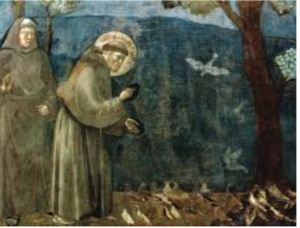
If you have the chance to take a walk in Umbria, you will be breathless by the beauty of this region: quiet streets climbing to the medieval villages, churches that contain priceless works of art, green forests on rolling hills …
These are the places where San Francesco lived, a Saint loved for his humility and his message of peace, in which he carried out his path of spiritual growth. Saint Francis was inspired from the serene beauty of nature when he wrote his praise to God, the Canticle of the Creatures, a wonderful hymn to life, and one of the first books of poetry of the origins of Italian literature:
“…Laudato si’, mi’ Signore, per sor’aqua,
la quale è multo utile et humile et pretiosa et casta(…)
Laudato si’, mi’ Signore, per sora nostra matre terra,
la quale ne sustenta et governa,
et produce diversi fructi con coloriti flori et herba(…)”
But getting back to the biscuits of San Francesco, mostaccioli, whose genuine and simple ingredients take us to nature.
Which is the bond between a friar, who makes a vow of poverty, with some cookies that after all represent a ‘plus’ in food, a sin? The history of mostaccioli is linked to a beautiful figure of a woman of the time: Jacoba de ‘Settesoli, a Roman noblewoman, who became a young widow and knew the saint. She became his follower and guided him through the streets of Rome during sermons. Jacoba worked hard and obtained the S. Cosimato Benedictine Abbey to become a shelter for the Franciscan friars, and San Biagio hospital, in Trastevere. Thanks to a Papal Bull in 1229, it became the first headquarters of the Order of the Friars Minor in the Holy City.
Based on the noblewoman’s strong character, Francis affectionately referred to her as ‘Friar Jacoba’ as she used to prepare the special biscuits, mostaccioli “boni and profumosi (yummy and scented).
Even the last time they met, when Jacopa went to Assisi to greet him on his deathbed, along with candles and dressed for burial, it is said that she had brought with her also the cookies that San Franceso loved: the mostaccioli.







